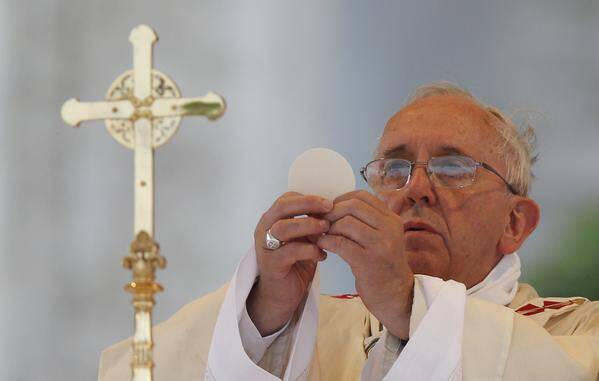Gospel: you are what you eat.
You are what you eat. There is some truth to this in the physical sense, as the bloated Western diet can lead us to heart disease and obesity, while more nutritious and moderate eating can lead to better health and more energy. Yet every physical food, in moderation, can be transformed into necessary fuel for the body.
But it is certainly true that in the spiritual sense, we are what we eat. What you eat is what you get. If you want wisdom, you need to partake of wisdom; for foolishness, unlike junk food, cannot be transformed into an essential component of the spiritual self. Even more, when you taste wisdom, there is no limit to the amount you can eat. It fills you up but always leaves you wanting more.
Proverbs bids us to eat of the spiritual food of wisdom. In vivid and evocative language, promising that “she has slaughtered her animals, she has mixed her wine, she has also set her table,” Wisdom says, “Come, eat of my bread and drink of the wine I have mixed.”
There is a metaphoric sense to eating and drinking in wisdom, for as with physical food, we come to know the best food by growing it, cooking it and tasting it. The more we try certain foods or types of wine, the more we know what is best. It is a matter of developing our palates, becoming sensitive to the food we eat, refining our tastes and discerning what is most healthy and nutritious.
There is no difference with the spiritual sense of food. To eat of wisdom is to “walk in the way of insight,” says Proverbs, while foolishness is “immaturity.” Wisdom is a spiritual food, and you need to become a gourmand. You need to know how to source it, to find the best purveyors, to find the hidden gems.
The call in the Letter to the Ephesians that we live “not as unwise people but as wise” is a call, therefore, to be discerning in the spiritual food we eat. We are told to “not be foolish, but understand what the will of the Lord is.” This is the process of a discerning palate, as eating at the table of wisdom is a process of insight and habituation, as is any growth in virtue. When we recognize that true spiritual food is what allows us to grow in wisdom, it becomes the only food we want to eat. The Alexandrian theologian Origen said that the spiritual sense of taste “feeds on living bread that has come down from heaven and gives life to the world” (De Principiis I.1.9). Participating in this meal is the height of wisdom.
Here we eat the meal that embodies wisdom itself, but only if our spiritual senses are attuned to the reality of this food. The dispute that Jesus’ teaching engenders in the Gospel of John, when some ask, “How can this man give us his flesh to eat?” is a good question when based on the physical senses. Christ’s flesh is truly being consumed, but it is spiritual wisdom that opens our eyes to the reality of the meal that goes beyond the physical elements. “My flesh is true food and my blood is true drink,” but only for those who have the ability to see that it is the spiritual food designed to bring us to eternal life.
If one does not discern the spiritual reality behind the claim “unless you eat the flesh of the Son of Man and drink his blood, you have no life in you,” it will simply be misunderstood as a physical impossibility or foolishness.
And it is only by eating at the table of wisdom in all its forms that deeper spiritual realities come to be understood. We need to taste and see all that wisdom offers us, for only when we have been trained and had our palates refined can we understand what it means to eat from the table of wisdom. Wisdom lays out a table for each of us every day, in the course of our work, with our families at home and even at play and at leisure. We need to be able to pick and choose from the table of wisdom, for the more we taste of it, the more discerning we become, until the only food we desire is wisdom itself, embodied in the body and blood of Christ at the eucharistic table.
This article also appeared in print, under the headline “Food of Wisdom,” in the August 3-10, 2015, issue.








